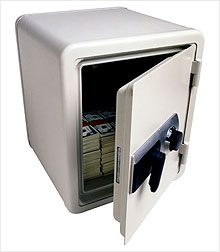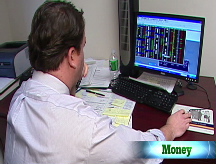A stock market investment with a no-loss guarantee
Absolute return notes protect your principal - but there's a catch.

(Fortune Small Business) -- A.Y. Brown is reaping the rewards of successful entrepreneurship. Over decades of financing and developing apartment complexes around Memphis, Brown, now 70, socked away enough money to retire at 52. Today, he and his wife live comfortably - off investment income - on their horse farm in Columbus, N.C. But the couple worry about the recent volatility in the financial markets.
"The older you get, the more concerned you become with capital preservation, but I always look for upside potential," Brown says.
About 18 months ago, Brown's financial adviser introduced him to absolute return notes, a fairly new type of security that sounded too good to be true. This financial instrument offers a chance to earn investment returns tied to the stock market's performance, while guaranteeing 100% protection of principal. Absolute return notes originated in Europe and have recently become popular domestically as investors struggle to cope with the stock market's free-fall.
During a predetermined time period, the notes pay the absolute value of the performance of a market index, within a specified range. If the S&P 500 goes up or down, say, 7%, a note pays 7%. But if the market goes beyond that range - plus or minus 20%, for example - you recoup only your principal. So if the index gains 25%, you won't benefit.
Leading issuers of absolute return notes include Barclays, Merrill Lynch and UBS (UBS). Fees for the notes are usually factored into the formula that determines the payout. So if you pay $10,000 for a note that offers 100% principal protection, you will receive at least $10,000 at maturity.
Brown invested more than $1 million in absolute return notes using funds from both his IRA and taxable accounts. He bought them mainly in blocks of $100,000, with staggered maturities to maintain liquidity. The move paid off nicely during the October market rout. "While we did lose some money, we had over 25% of our holdings in these notes," Brown says.
"Getting no return upon maturity didn't sound too appealing in 2007," adds Brown's financial adviser, Frederick Wright, chief investment officer at Smith & Howard Wealth Management in Atlanta. "But after everyone got hammered in 2008, it doesn't sound so bad to just recover your principal."
Two of Brown's $100,000 notes matured before the end of 2008, and both of them breached their range. "I regret not making any earnings," Brown says. "But it's wonderful to get the principal back, particularly now, when so many stocks are selling at low prices."
"Absolute return notes sold well in 2008," says Brad Livingston, vice president of structured products at Advisors Asset Management in San Antonio. "They are short-term investment strategies that make sense if you believe the market will trade flat or sideways and you want to capitalize on its volatility in either direction." ![]()
-
The Cheesecake Factory created smaller portions to survive the downturn. Play
-
A breeder of award-winning marijuana seeds is following the money and heading to the U.S. More
-
Most small businesses die within five years, but Amish businesses have a survival rate north of 90%. More
-
The 10 most popular franchise brands over the past decade -- and their failure rates. More
-
These firms are the last left in America making iconic products now in their twilight. More









